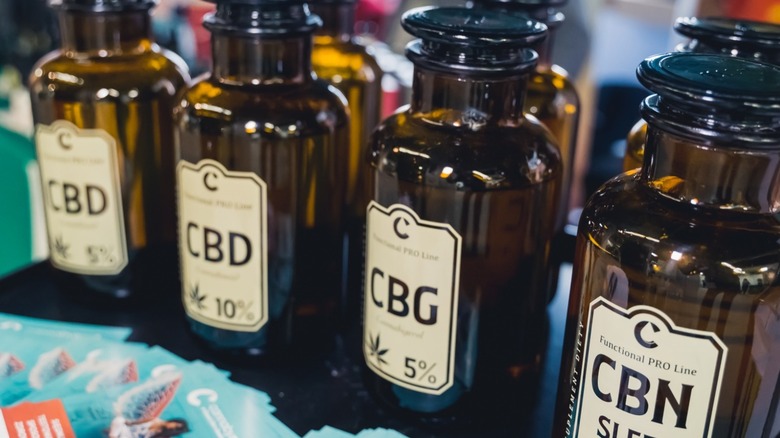Do CBD And CBG Have The Same Therapeutic Benefits?
In the wake of the U.S. Congress removing hemp from the controlled substances list with the passage of the Agriculture Improvement Act in 2018, cannabidiol (CBD) effectively became legal to market and consume, as long as it is derived from the hemp plant as opposed to cannabis plants, which possess psychedelic properties, per the Centers for Disease Control and Prevention.
CBD can get a bit confusing because, in addition to hemp plants, it is also found in cannabis plants that contain over 0.3% of the active ingredient tetrahydrocannabinol (THC). THC, not CBD, is the ingredient that creates what people describe as a high feeling, per Healthline.
However, the hemp plant contains 0.3% or less of THC, and CBD itself contains zero THC. Consequently, CBD does not make people high. Nonetheless, even though CBD doesn't provide a high, many believe that there are chemicals in CBD that are effective in reducing nausea, anxiety, and insomnia as well as managing pain, among providing other health benefits. Even so, the Food and Drug Administration has currently only approved CBD for the treatment of seizures, per MedicalNewsToday.
But CBD isn't the only chemical compound found in hemp that people believe provides therapeutic benefits. A lesser-known cannabinoid called cannabigerol (CBG) is also considered by some people to have therapeutic benefits. Considering CBD and CBG are both found in the hemp plant you might think it doesn't matter which you consume. However, while CBD and CBG have similarities, one may be more appropriate than the other depending on your issue, per Discover.
This is the difference between CBD and CBG
The reason both CBD and CBG products have become popular over the years is because of the impact they seem to have on certain systems in the body. For example, everyone has a network that extends throughout the body called the endocannabinoid system (ECS). Only recently discovered, the ECS has a major role in regulating a variety of important bodily functions. This system is comprised of cannabinoid receptors that, in order to perform their jobs, need to be stimulated by chemicals in our body called endocannabinoids, which contain molecules that are similar to those in the cannabis plant, according to the experts at Harvard Health Publishing.
Your ECS has two receptors called CB1, which is associated with your central nervous system, and CB2, which is related to your immune system. Based on some early research, data seems to show that CBG acts on your CB1 and CB2 receptors and may help in treating Crohn's disease, ulcerative colitis, multiple sclerosis, Parkinson's disease, Huntington's disease, and anxiety disorders, per Women's Health.
With regard to CBD, the experts at MedicalNewsToday state that research suggests that CBD may help more with anxiety and inflammatory diseases, though it may also help with neurodegenerative conditions like Alzheimer's disease and Parkinson's disease.
Whether you are considering consuming a CBD or CBG product, be sure to consult with your healthcare provider to determine if these products are safe for you based on your medical circumstances, advises Harvard Health Publishing.


